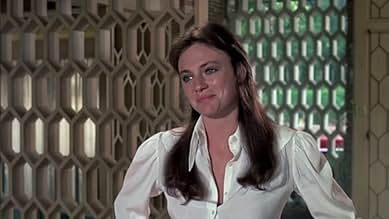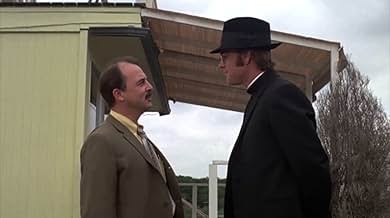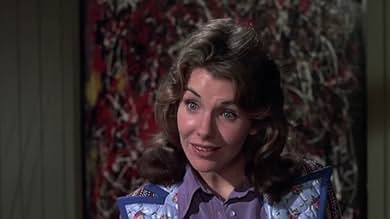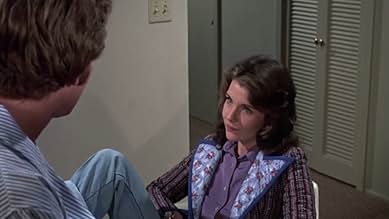NOTE IMDb
6,1/10
1,4 k
MA NOTE
Ajouter une intrigue dans votre langueA computer programmer decides to become a thief. And when he starts making waves an insurance investigator hounds him. He also meets a woman who becomes his accomplice.A computer programmer decides to become a thief. And when he starts making waves an insurance investigator hounds him. He also meets a woman who becomes his accomplice.A computer programmer decides to become a thief. And when he starts making waves an insurance investigator hounds him. He also meets a woman who becomes his accomplice.
- Réalisation
- Scénario
- Casting principal
Ollie Ree Alridge
- Maid
- (non crédité)
Jim Antonio
- Poker Player
- (non crédité)
Army Archerd
- Newsman
- (non crédité)
Avis à la une
In 1973, the best chess programs running on the fastest supercomputers could barely play a passable game of chess, much less challenge a master level player such as the Austin Pendleton character would be (newspaper chess columnist for the Houston Chronicle).
Ryan O'Neal's performance in "The Thief Who Came to Dinner" (1973) reflects mature professionalism. The story is agreeable enough: Computer programmer Mr. Straight abruptly quits his job to become a jewel-thief.
Walter Hill authored this script before beginning his directorial career. Here, his work takes on a more ironic tone than the stone-cold nature of his other accomplishments ("The Driver," "The Warriors," the screenplay for Peckinpah's "The Getaway"). But when Hill works tongue-in-cheek, as in parts of "The Long Riders" and all of "48 Hours," the results can be crafty and diverting. Here, the jokes don't always work, but one can still appreciate the intelligence behind them.
"Thief" was directed by Bud Yorkin, known primarily for his association with TV producer Norman Lear ("All In The Family"). As a moviemaker, Yorkin falls down on the job. He has a pedestrian talent for setting up visual gags, but there's no payoff. Where the film calls for laughter, there's only a chuckle. Not that "Thief" needed a comic genius behind the camera, but this movie should have been a whole lot better.
Walter Hill authored this script before beginning his directorial career. Here, his work takes on a more ironic tone than the stone-cold nature of his other accomplishments ("The Driver," "The Warriors," the screenplay for Peckinpah's "The Getaway"). But when Hill works tongue-in-cheek, as in parts of "The Long Riders" and all of "48 Hours," the results can be crafty and diverting. Here, the jokes don't always work, but one can still appreciate the intelligence behind them.
"Thief" was directed by Bud Yorkin, known primarily for his association with TV producer Norman Lear ("All In The Family"). As a moviemaker, Yorkin falls down on the job. He has a pedestrian talent for setting up visual gags, but there's no payoff. Where the film calls for laughter, there's only a chuckle. Not that "Thief" needed a comic genius behind the camera, but this movie should have been a whole lot better.
I've seen this film twice, and I like it quite a bit. It's possibly the best performance O'Neal has given, Oates does a nice turn, and it has Jackie Bisset. The plot is okay, but the performances really give this film its punch. "Thief..." may not be for everyone, but it's worth a shot. The film may seem a bit dated and slow, so viewer beware.
There are some humorous scenes, some suspense, some great Houston locations, some really bad 1970s clothes and some interesting architecture,
This film relies mostly on the attractiveness and charm of its leads in their physical prime.
This film relies mostly on the attractiveness and charm of its leads in their physical prime.
Okay, what do you need to perfect or make a good movie about theivery? A strong plot or a good source to base it on. B.fleshed out and fun characters C.a fun storyline or D.all of the above. If you said all of the above, that's right. These are the central elements that makes "The Thief Who Came to Dinner", worth checking out. Okay, first off this a dated 70's film that will probably turn off most people, but if you don't take it seriously as it tries to be, it's worth it's running time. Ryan O'Neal stars as Webster McGee, a computer programmer who one day ups and quits his somewhat cushy job and becomes a burglar. McGee is a very cocky, fun-loving guy, who you wouldn't suspect as being someone who'd break into your home and steal things. That he does it with such precision, so much so that he has an investigator played by the late Warren Oates hot on his trail. While playing mind games with Oates, he falls in love with Laura (Jacqueline Bisset), who knows what he does and accepts him for it, which goes unexplained in the movie. Director Bud Yorkin does a very good job here directing from Walter Hill's adapted screenplay. But it if was tighter paced, it would've been a lot more fun. There are times where the film lags and it really feels as it's missing something. There are alot of nice and breezy sequences prefectly shot by Director of Photograph Phillip Lanthrop. Henry Mancini's score is absolutely fabulous and arguably one of his more underrated gems. A little more energy would've gone a long way with this one. On the whole, I'd recommend it for it's performances and definetly rooting for the Chess Burglar.
Le saviez-vous
- AnecdotesJacqueline Bisset took over the role of Laura from Charlotte Rampling, who bowed out because of pregnancy. [VARIETY, Mar 15, 1972]
- GaffesTravis is pulled over by police and is asked for the car's registration. In the 1970s, Texas did not require that the registration be kept in the car, and officers did not ask for it. Hollywood got it wrong because in California drivers were required to present their "registration".
- ConnexionsFeatured in Gazap Rüzgari (1983)
Meilleurs choix
Connectez-vous pour évaluer et suivre la liste de favoris afin de recevoir des recommandations personnalisées
- How long is The Thief Who Came to Dinner?Alimenté par Alexa
Détails
Box-office
- Montant brut aux États-Unis et au Canada
- 679 839 $US
Contribuer à cette page
Suggérer une modification ou ajouter du contenu manquant





















